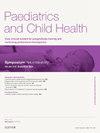智力残疾诊断:儿童和青少年多机构筛查、评估、报告和干预措施的最新情况
Q3 Medicine
引用次数: 0
摘要
智力残疾(ID)的诊断可以成为个人一生中的一个保护因素。ID是一种神经发育障碍、终身残疾和残疾身份。对儿童和青年进行早期筛查和评估可以减少评估过程的重复和等待名单,是干预的一个重要组成部分。评估和诊断的障碍包括评估途径的可用性有限,评估实践的专业信心有限,以及在卫生和教育环境中对儿童发展的共同理解有限。早期诊断和干预可以改善个人的身心健康、支持网络、教育成果和向成年的过渡。本文旨在概述筛查、评估和报告ID过程中的关键问题,并为临床医生提供有关评估工具和相关干预领域的清晰度。一个地方当局在保健和教育服务部门之间制定了多机构程序,以便在儿童和青年进入成年之前更好地识别和支持他们。更广泛的多学科和多机构对身份证的认识和评估可以对更广泛地确定个人和家庭的需要和支助以及提供服务具有变革意义。本文章由计算机程序翻译,如有差异,请以英文原文为准。
Diagnosis of intellectual disability: updates on multi-agency screening, assessment, reporting and interventions for children and young people
Diagnosis of intellectual disability (ID) can be a protective factor for individuals across their life course. ID is a neurodevelopmental disorder, lifelong disability, and disability identity. Early screening and assessment in children and young people can reduce duplication of assessment processes, waiting lists and is an essential component for intervention. Barriers to assessment and diagnosis have included limited availability of assessment pathways, professional confidence in assessment practice, and limited shared developmental understanding of a child across health and education settings. Early diagnosis and intervention can improve individuals’ physical and mental health, support networks, educational outcomes, and transition into adulthood. This article seeks to outline key issues in the processes of screening, assessment, and reporting of ID and provide clarity for clinicians regarding assessment tools and areas for relevant intervention. Multi-agency processes have been developed in one local authority between health and education services to improve identification and support for children and young people before they enter adulthood. Wider multidisciplinary and multi-agency awareness and assessment of ID can be transformative for a broader formulation of individual and family needs and supports, and service delivery.
求助全文
通过发布文献求助,成功后即可免费获取论文全文。
去求助
来源期刊

Paediatrics and Child Health (United Kingdom)
Medicine-Pediatrics, Perinatology and Child Health
CiteScore
1.20
自引率
0.00%
发文量
70
 求助内容:
求助内容: 应助结果提醒方式:
应助结果提醒方式:


